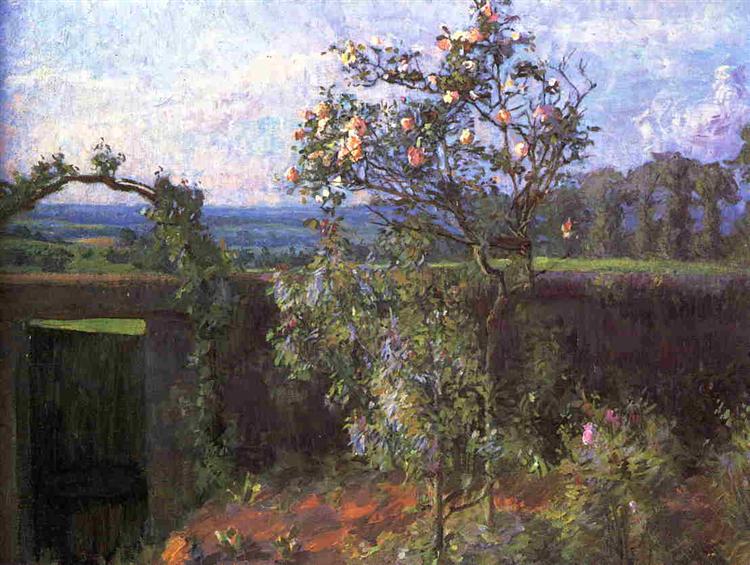Description
The work "Landscape near Yerres" by Gustave Cailbotte, painted in 1877, is a fascinating example of the innovative approach that the artist adopted towards the landscape and natural light. Cailbotte, a prominent member of the impressionist movement, is distinguished by its unique ability to combine a realistic approach and an almost poetic perception of the environment. In this painting, as in many of his works, the love of the artist by nature manifests itself through a detailed treatment of color and composition, making this piece not only a landscape, but a vibrant study of visual experience.
At first glance, painting impresses with its visual complexity and its color. Cailbotte uses a predominantly green palette that varies from dark tones to brighter nuances, suggesting the wealth of foliage and dense vegetation that surrounds the landscape. The use of intense green is complemented with blue in the sky, which suggests a serene and luminous afternoon, possibly after a rain, a moment in which the light tends to be softer and where the shadows mark a set of contrasts subtle The brushstrokes, although visible, are amalgamated in a way that provides a sensation of cohesion and fluidity, inviting the viewer to immerse themselves in the scene.
A notable aspect of "landscape near Yerres" is its composition. CAILBOTTE opts for an approach that emphasizes perspective and depth, which is achieved through the disposition of natural elements and the background of the painting. The horizon line is low in the frame, allows the viewer to contemplate a vast vegetation field, which unfolds to the front in a slightly elevated terrain. In addition, the inclusion of sinuous roads and the way in which the landscape lines are intertwined guided, creating a sense of movement and visual exploration. Thus, the landscape is not a mere static representation, but a place that invites you to be traveled and lived.
Although there are no human characters on the scene, the underlying feeling of life is palpable. The stillness of nature feels present, and the absence of human figures can be interpreted as an invitation to contemplate the beauty of the natural world in its purest state. This approach also reflects a trend of impressionism of focusing on everyday life, but through the beauty lens.
Cailbotte is known for his technical ability and attention to detail, which allowed him to capture both the light and the atmosphere in his work. Compared to contemporary works of other impressionists who usually focus on urban scenes and everyday life, "landscape near Yerres" shows a clear connection with nature and an exploration of the rural environment. This work is in good dialogue with other pieces of its corpus that also address the landscape but from different approaches, such as "The Argenteuil Bridge" or "La Siesta".
Ultimately, "landscape near Yerres" can be interpreted not only as a portrait of a specific moment in time, but as a tribute to the beauty that resides in nature itself. Through its mastery in the use of color, composition and atmosphere, Gustave Caillebotte invites the viewer to experience the silence of the landscape and the peace that it can offer, thus revealing a complex and rich reality that goes beyond the visible .
KUADROS ©, a famous paint on your wall.
Hand-made oil painting reproductions, with the quality of professional artists and the distinctive seal of KUADROS ©.
Reproduction service paintings With a guarantee of satisfaction. If you are not completely satisfied with the replica of your painting, we refund your money 100%.

